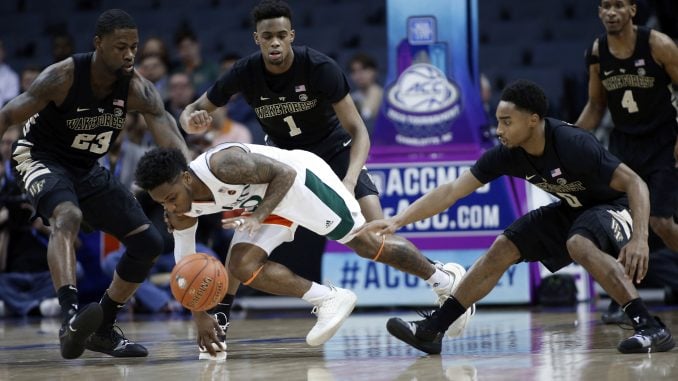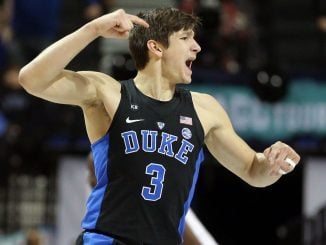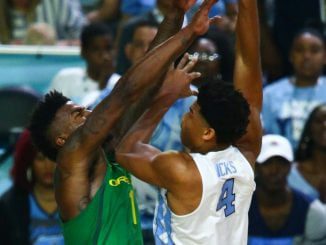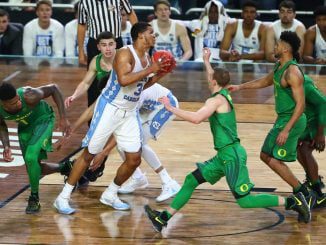
CHARLOTTE — Of the first 27 times the ACC contested its signature event, its postseason men’s basketball tournament, only once was it played at a site outside of North Carolina.
It was an arrangement not everyone in the conference considered fair.
No one was more vocal about the inequity than colorful Maryland coach Lefty Driesell.
In 1980, after losing in the championship game for the fourth time — all to North Carolina teams — the future Hall of Famer proclaimed that if he ever won a tournament title, he’d bolt the trophy to the hood of his car and drive it from one end of the Old North State to the other.
Driesell didn’t follow through on his victory lap after finally winning the crown four years later, against Duke in Greensboro, but that doesn’t mean his attitude toward the tournament’s perceived North Carolina bias had changed.
It’s a theme another frustrated Maryland coach, Gary Williams, picked up on and ran with until passing the torch to the ACC’s current curmudgeon, Jim Boeheim of Syracuse.
Boeheim’s disdain for North Carolina sites, especially Greensboro, has more to do with his Big East roots and love for New York than any advantage they give to rivals North Carolina and Duke. But with the tournament returning “home” for the first time in four years this week at Charlotte’s Spectrum Center, the question begs to be asked:
Do the Tar Heels and Blue Devils, and to a lesser extent NC State and Wake Forest, really have a competitive edge when the ACC Tournament is within the confines of their home state?
The answer depends on where you’re from.
“We know we are playing a Tobacco Road team on Tobacco Road,” Notre Dame coach Mike Brey said upon joining the league in 2013, “We understand that those teams always have plenty of support (there).”
As helpful as that support might be, UNC’s Roy Williams and Duke’s Mike Krzyzewski are quick to counter that no one has ever made a basket or grabbed a rebound from the stands. And that that once the games begin, it doesn’t really matter where the tournament is played.
History supports their claim.
In the 43 years since the ACC held its first tournament away from its home base at the old Capital Center in Landover, Md., there has been little to no difference in the rate with which state teams have won the title.
UNC, Duke, NC State and Wake have combined to cut down the nets 75.9 percent of the time in either Charlotte or Greensboro (22 of 29) while winning 71.4 percent of the tournaments (10 of 14) held in Landover, Atlanta, Tampa, Washington, D.C., or, more recently, Brooklyn.
And while five of the last seven renewals have been won by non-North Carolina teams, all but two of those victories — Florida State in Atlanta in 2012 and Virginia in Brooklyn last year — were earned in Greensboro.
With the tournament becoming more difficult to win now that it’s morphed from a cozy eight-team event played over three days into its current 15-team, weeklong format, the debate over where it is held has become more provincial than purposeful.
It’s similar to the battle over where the best style of BBQ is served. Everyone has their own personal preference and nothing anything anyone tells them will change their mind.
In the case of the ACC Tournament, the preferences are divided almost evenly between those that were part of the league before expansion and those that have joined since.
“I’m a North Carolina guy,” UNC’s Williams said at the ACC’s preseason Operation Basketball media day last fall. “I was born in the state and raised in the state. I like the ACC Tournament better in Charlotte or Greensboro.”
Boeheim, by contrast, was born and raised in Western New York. Having spent the best years of his career at Syracuse battling former Big East rivals under the bright lights of Madison Square Garden every March, Boeheim understandably has a different opinion than Williams on where the tournament should be.
It’s an opinion that generated headlines at the ACC’s first trip to Brooklyn in 2017 when he famously said that there was “no value to playing in Greensboro. None.”
Boeheim has since softened his stance, joking that it doesn’t really matter where the tournament is played since his team hasn’t done well in any venue since joining the ACC. But like Driesell before him, it doesn’t mean he’s changed his mind about the subject.
“Everything I’ve said about tournaments, I think it’s just better when you go to a big city,” he said when asked about the subject following a recent game at Wake Forest. “My friend Roy (Williams) said that the (Masters) tournament in Augusta is pretty good and that’s in a small town, but that’s the only tournament going on in the country at the time.
“In college basketball, there’s 22 tournaments going on at the same time. From a best-case scenario for the league, it’s best to move around. And I think the league is listening.”
To that point, commissioner John Swofford has made a concerted effort to accommodate all areas of the ACC’s expanding “geographic footprint” when it comes to choosing tournament sites.
After returning to Charlotte this year, ending the longest stretch the event has ever been away from North Carolina, it will move on to Greensboro in 2020 before going to Washington in 2021 and Brooklyn in 2020.
No sites have been determined beyond that. But from Swofford’s comments at the ACC’s most recent media day, that pattern is likely to be repeated for the foreseeable future.
“We’ve talked a lot about respecting the past and embracing the present and the future,” the commissioner said. “We’re fortunate to have outstanding venues in our footprint that are run extraordinarily well, and we’re extremely fortunate to have fan bases at our schools that continue to make our tournament successful wherever it is played.
“There doesn’t seem to be another league out there that can move their tournament around and have the success with it that we’ve been fortunate enough to have. That’s because of our fans and the tradition and history that was built with the tournament over a long period of time. And most of that was built in North Carolina.”



